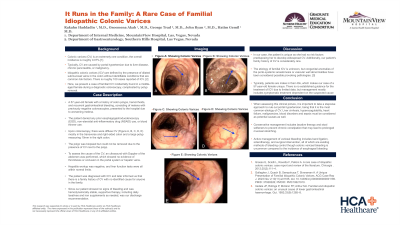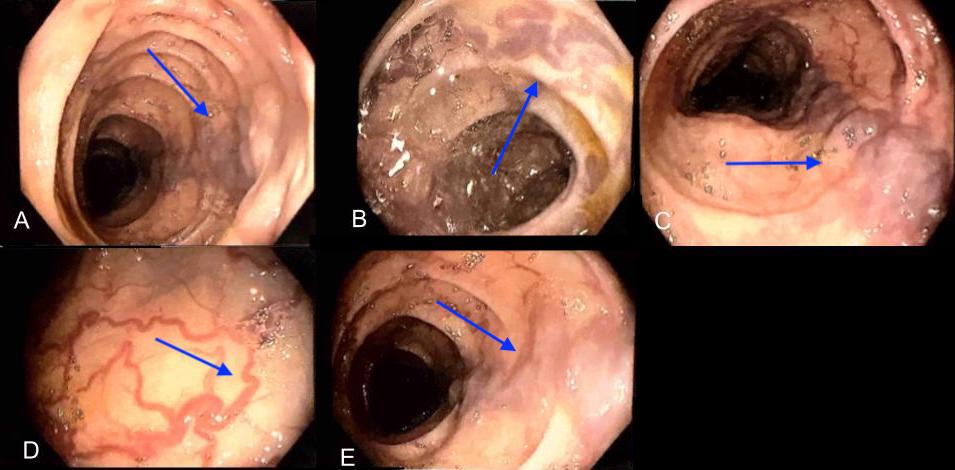Sunday Poster Session
Category: Colon
P0319 - It Runs in the Family: A Rare Case of Familial Idiopathic Colonic Varices
Sunday, October 27, 2024
3:30 PM - 7:00 PM ET
Location: Exhibit Hall E

Has Audio

Rakahn Haddadin, MD
MountainView Hospital
Las Vegas, NV
Presenting Author(s)
Rakahn Haddadin, MD1, Ozoemena Akah, MD1, George Trad, MD2, John Ryan, MD2, Hatim Gemil, MD1
1MountainView Hospital, Las Vegas, NV; 2Sunrise Health GME Consortium, Las Vegas, NV
Introduction: Colonic varices (CV) are an extremely rare condition. Typically, CV are caused by portal hypertension due to liver disease, chronic pancreatitis, or malignancy. Idiopathic colonic varices (ICV) are defined by the presence of dilated submucosal veins in the colon without identifiable conditions that are common risk factors. Here, we present a case of familial ICV incidentally found in a middle-aged female during a diagnostic colonoscopy, complicated by polyp removal.
Case Description/Methods: A 57-year-old female with a history of colon polyps, hemorrhoids, and recurrent gastrointestinal bleeding, consisting of melena with previously negative colonoscopies, presented to the hospital due to worsening melena. The patient denied any prior esophagogastroduodenoscopy (EGD), non-steroidal anti-inflammatory drug (NSAID) use, or blood thinner use. Upon colonoscopy, there were diffuse CV (Figure A, B, C, D, E) mostly in the transverse and right-sided colon and a large polyp measuring 10mm in the right colon. The polyp was biopsied but could not be removed due to the presence of CV next to the polyp.
To assess the cause of the CV, an ultrasound with Doppler of the abdomen was performed, which showed no evidence of thrombosis or occlusion in the portal system or hepatic veins. Hepatitis workup was negative, and liver function tests were all within normal limits. The patient was diagnosed with ICV and later informed us that there is a family history of CV with no identified cause for anyone in the family. Since our patient showed no signs of bleeding and was hemodynamically stable, supportive therapy, including daily laxatives and iron supplements as needed, was our discharge recommendation.
Discussion: In our case, the patient is unique as she had no risk factors predisposing her to develop widespread CV. Additionally, our patient's family history of CV is considerably rare. The etiology of familial ICV is unknown, but congenital anomalies of the porto-systemic anastomosis or vascular wall abnormalities have been considered possible provoking pathologies. Typically, patients are males in their 40s, which makes our case of a 57-year-old female unique. There is no established guidance for the treatment of ICV due to limited data, but management mostly includes symptomatic treatment dependent on the suspected cause.

Disclosures:
Rakahn Haddadin, MD1, Ozoemena Akah, MD1, George Trad, MD2, John Ryan, MD2, Hatim Gemil, MD1. P0319 - It Runs in the Family: A Rare Case of Familial Idiopathic Colonic Varices, ACG 2024 Annual Scientific Meeting Abstracts. Philadelphia, PA: American College of Gastroenterology.
1MountainView Hospital, Las Vegas, NV; 2Sunrise Health GME Consortium, Las Vegas, NV
Introduction: Colonic varices (CV) are an extremely rare condition. Typically, CV are caused by portal hypertension due to liver disease, chronic pancreatitis, or malignancy. Idiopathic colonic varices (ICV) are defined by the presence of dilated submucosal veins in the colon without identifiable conditions that are common risk factors. Here, we present a case of familial ICV incidentally found in a middle-aged female during a diagnostic colonoscopy, complicated by polyp removal.
Case Description/Methods: A 57-year-old female with a history of colon polyps, hemorrhoids, and recurrent gastrointestinal bleeding, consisting of melena with previously negative colonoscopies, presented to the hospital due to worsening melena. The patient denied any prior esophagogastroduodenoscopy (EGD), non-steroidal anti-inflammatory drug (NSAID) use, or blood thinner use. Upon colonoscopy, there were diffuse CV (Figure A, B, C, D, E) mostly in the transverse and right-sided colon and a large polyp measuring 10mm in the right colon. The polyp was biopsied but could not be removed due to the presence of CV next to the polyp.
To assess the cause of the CV, an ultrasound with Doppler of the abdomen was performed, which showed no evidence of thrombosis or occlusion in the portal system or hepatic veins. Hepatitis workup was negative, and liver function tests were all within normal limits. The patient was diagnosed with ICV and later informed us that there is a family history of CV with no identified cause for anyone in the family. Since our patient showed no signs of bleeding and was hemodynamically stable, supportive therapy, including daily laxatives and iron supplements as needed, was our discharge recommendation.
Discussion: In our case, the patient is unique as she had no risk factors predisposing her to develop widespread CV. Additionally, our patient's family history of CV is considerably rare. The etiology of familial ICV is unknown, but congenital anomalies of the porto-systemic anastomosis or vascular wall abnormalities have been considered possible provoking pathologies. Typically, patients are males in their 40s, which makes our case of a 57-year-old female unique. There is no established guidance for the treatment of ICV due to limited data, but management mostly includes symptomatic treatment dependent on the suspected cause.

Figure: Figures A,B,C,D,E= Colonic varices seen during colonoscopy.
Disclosures:
Rakahn Haddadin indicated no relevant financial relationships.
Ozoemena Akah indicated no relevant financial relationships.
George Trad indicated no relevant financial relationships.
John Ryan indicated no relevant financial relationships.
Hatim Gemil indicated no relevant financial relationships.
Rakahn Haddadin, MD1, Ozoemena Akah, MD1, George Trad, MD2, John Ryan, MD2, Hatim Gemil, MD1. P0319 - It Runs in the Family: A Rare Case of Familial Idiopathic Colonic Varices, ACG 2024 Annual Scientific Meeting Abstracts. Philadelphia, PA: American College of Gastroenterology.
